Lightweight Kubernetes Distributions Practices

Deploying and managing native Kubernetes clusters could be challenging, so the community developed lightweight Kubernetes distributions to make operations easier.
Using Minikube with Podman
Minikube is a lightweight Kubernetes implementation that creates a VM on your local machine and deploys a simple cluster containing only one node.
Podman is an open-source container runtime tool offering functionality similar to Docker, but operates without a daemon and supports enhanced security features and rootless mode execution.
Basic
OS: macOS
Architecture: ARM64
Driver: Podman
CPUs: 2
Memory: 2Gi
Disk: 20GiB
Installer: HomebrewSetup Podman
➜ brew install podman
==> Installing dependencies for podman: capstone, dtc, pcre2, gettext, glib, gmp, libtasn1, nettle, p11-kit, openssl@3, libnghttp2, unbound, gnutls, jpeg-turbo, libpng, libslirp, libssh, libusb, lzo, pixman, snappy, vde and qemu
==> podman➜ podman machine init --cpus 2 --memory 2048 --disk-size 20 --rootful
Downloading VM image: fedora-coreos-39.20231204.2.1-qemu.aarch64.qcow2.xz: done
Extracting compressed file: podman-machine-default_fedora-coreos-39.20231204.2.1-qemu.aarch64.qcow2: done
Image resized.
Machine init complete➜ podman machine start
Starting machine "podman-machine-default"
Waiting for VM ...
Mounting volume... /Users:/Users
Mounting volume... /private:/private
Mounting volume... /var/folders:/var/folders
API forwarding listening on: /Users/damonguo/.local/share/containers/podman/machine/qemu/podman.sock
The system helper service is not installed; the default Docker API socket address can't be used by podman.
If you would like to install it, run the following commands:
sudo /opt/homebrew/Cellar/podman/4.8.1/bin/podman-mac-helper install
podman machine stop; podman machine start
You can still connect Docker API clients by setting DOCKER_HOST using the following command in your terminal session:
export DOCKER_HOST='unix:///Users/damonguo/.local/share/containers/podman/machine/qemu/podman.sock'
Machine "podman-machine-default" started successfully➜ podman machine list
NAME VM TYPE CREATED LAST UP CPUS MEMORY DISK SIZE
podman-machine-default qemu 8 minutes ago Currently running 2 2GiB 20GiBSetup Minikube
➜ brew install minikube
==> Installing dependencies for minikube: kubernetes-cli
==> minikube➜ minikube config set driver podman
These changes will take effect upon a minikube delete and then a minikube start➜ minikube start --driver=podman --kubernetes-version=v1.28.3
minikube v1.32.0 on Darwin 14.1.2 (arm64)
Using the podman (experimental) driver based on user configuration
Using Podman driver with root privileges
Starting control plane node minikube in cluster minikube
Pulling base image ...
Downloading Kubernetes v1.28.3 preload ...
preloaded-images-k8s-v18-v1...: 341.16 MiB / 341.16 MiB 100.00% 13.99 M
gcr.io/k8s-minikube/kicbase...: 410.58 MiB / 410.58 MiB 100.00% 13.22 M
Creating podman container (CPUs=2, Memory=1887MB) ...
Preparing Kubernetes v1.28.3 on Docker 24.0.7 ...
Generating certificates and keys ...
Booting up control plane ...
Configuring RBAC rules ...
Configuring bridge CNI (Container Networking Interface) ...
Verifying Kubernetes components...
Using image gcr.io/k8s-minikube/storage-provisioner:v5
Enabled addons: storage-provisioner, default-storageclass
Done! kubectl is now configured to use "minikube" cluster and "default" namespace by default➜ minikube status
minikube
type: Control Plane
host: Running
kubelet: Running
apiserver: Running
kubeconfig: Configured➜ kubectl get namespaces
NAME STATUS AGE
default Active 4m40s
kube-node-lease Active 4m40s
kube-public Active 4m40s
kube-system Active 4m40s
➜ kubectl get nodes
NAME STATUS ROLES AGE VERSION
minikube Ready control-plane 4m44s v1.28.3
➜ kubectl get svc
NAME TYPE CLUSTER-IP EXTERNAL-IP PORT(S) AGE
kubernetes ClusterIP 10.96.0.1 <none> 443/TCP 16mDeploy Nginx Service
➜ vim nginx-deploy-svc.yaml
---
apiVersion: apps/v1
kind: Deployment
metadata:
name: nginx-deploy
spec:
replicas: 2
selector:
matchLabels:
app: nginx
template:
metadata:
labels:
app: nginx
spec:
containers:
- name: nginx
image: nginx
ports:
- containerPort: 80
---
apiVersion: v1
kind: Service
metadata:
name: nginx-svc
spec:
selector:
app: nginx
type: NodePort
ports:
- name: http
port: 80➜ kubectl apply -f nginx-deploy-svc.yaml
deployment.apps/nginx-deploy created
service/nginx-svc created➜ kubectl get all
NAME READY STATUS RESTARTS AGE
pod/nginx-deploy-7c5ddbdf54-4d8c2 1/1 Running 0 67s
pod/nginx-deploy-7c5ddbdf54-cmcg2 1/1 Running 0 67s
NAME TYPE CLUSTER-IP EXTERNAL-IP PORT(S) AGE
service/kubernetes ClusterIP 10.96.0.1 <none> 443/TCP 24m
service/nginx-svc NodePort 10.103.72.229 <none> 80:31985/TCP 67s
NAME READY UP-TO-DATE AVAILABLE AGE
deployment.apps/nginx-deploy 2/2 2 2 67s
NAME DESIRED CURRENT READY AGE
replicaset.apps/nginx-deploy-7c5ddbdf54 2 2 2 67s➜ minikube service nginx-svc --url
http://127.0.0.1:51726
Because you are using a Docker driver on darwin, the terminal needs to be open to run it.Access Nginx via Tunnel: http://127.0.0.1:51726
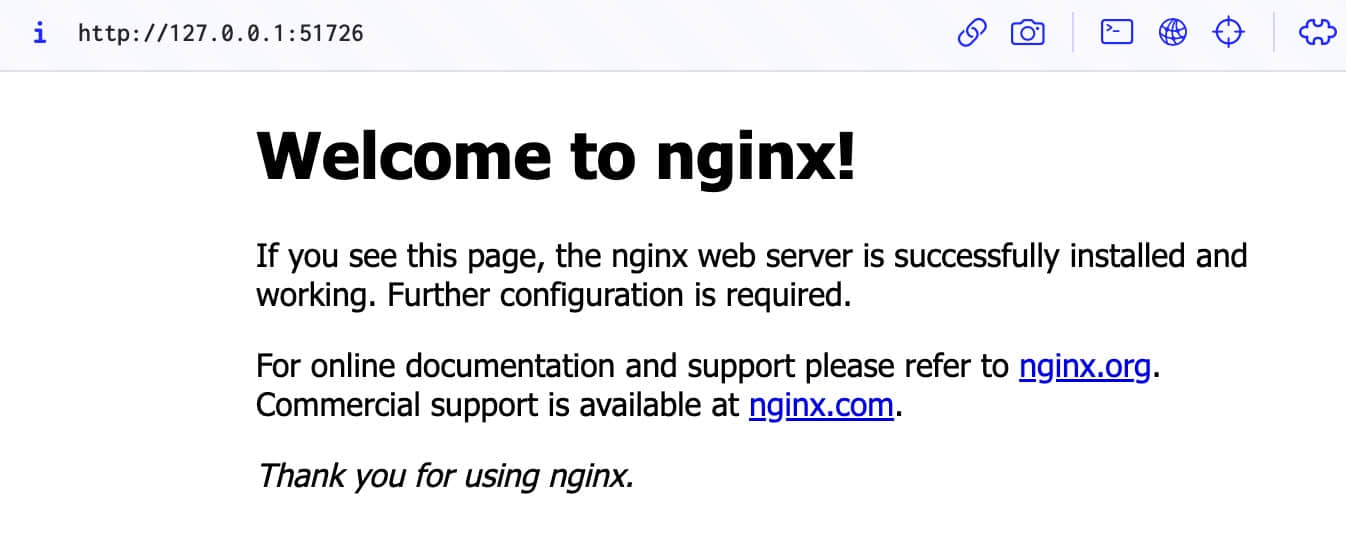
Cleanup Minikube and Podman
➜ minikube stop
Stopping node "minikube" ...
Powering off "minikube" via SSH ...
1 node stopped.➜ minikube status
minikube
type: Control Plane
host: Stopped
kubelet: Stopped
apiserver: Stopped
kubeconfig: Stopped➜ minikube delete
Deleting "minikube" in podman ...
Deleting container "minikube" ...
Removing /Users/damonguo/.minikube/machines/minikube ...
Removed all traces of the "minikube" cluster.➜ podman machine list
NAME VM TYPE CREATED LAST UP CPUS MEMORY DISK SIZE
podman-machine-default qemu 54 minutes ago Currently running 2 2GiB 20GiB➜ podman machine stop podman-machine-default
Waiting for VM to exit...
Machine "podman-machine-default" stopped successfully➜ podman machine rm podman-machine-default
The following files will be deleted:
/Users/damonguo/.ssh/podman-machine-default
/Users/damonguo/.ssh/podman-machine-default.pub
/Users/damonguo/.config/containers/podman/machine/qemu/podman-machine-default.ign
/Users/damonguo/.local/share/containers/podman/machine/qemu/podman-machine-default_fedora-coreos-39.20231204.2.1-qemu.aarch64.qcow2
/Users/damonguo/.local/share/containers/podman/machine/qemu/podman.sock
/Users/damonguo/.local/share/containers/podman/machine/qemu/podman-machine-default_ovmf_vars.fd
/Users/damonguo/.config/containers/podman/machine/qemu/podman-machine-default.json
Are you sure you want to continue? [y/N] y➜ minikube delete --purge --all
Successfully deleted all profiles
Successfully purged minikube directory located at - [/Users/damonguo/.minikube]
➜ brew uninstall minikube
➜ brew uninstall podmanUsing KinD
KinD (Kubernetes in Docker) is a tool for running local Kubernetes clusters in Docker.
Basic
OS: macOS
Architecture: ARM64
Driver: Docker
Installer: HomebrewSetup KinD
➜ brew install kind
==> Installing kind
==> Pouring kind--0.20.0.arm64_sonoma.bottle.tar.gz
==> kind➜ kind version
kind v0.20.0 go1.21.1 darwin/arm64Create a cluster ‘mycluster’, allow the local host to make requests to the Ingress controller over port 30080.
➜ vim config-with-port-mapping.yaml
kind: Cluster
apiVersion: kind.x-k8s.io/v1alpha4
nodes:
- role: control-plane
extraPortMappings:
- containerPort: 30080
hostPort: 30080➜ kind create cluster --name mycluster --config=config-with-port-mapping.yaml
Creating cluster "mycluster" ...
✓ Ensuring node image (kindest/node:v1.27.3)
✓ Preparing nodes
✓ Writing configuration
✓ Starting control-plane
✓ Installing CNI
✓ Installing StorageClass
Set kubectl context to "kind-mycluster"
You can now use your cluster with:
kubectl cluster-info --context kind-mycluster
Thanks for using kind!➜ kubectl cluster-info --context kind-mycluster
Kubernetes control plane is running at https://127.0.0.1:64070
CoreDNS is running at https://127.0.0.1:64070/api/v1/namespaces/kube-system/services/kube-dns:dns/proxy➜ kind get clusters
mycluster➜ kubectl get nodes
NAME STATUS ROLES AGE VERSION
mycluster-control-plane Ready control-plane 85s v1.27.3
➜ kubectl get pods -n kube-system
NAME READY STATUS RESTARTS AGE
coredns-5d78c9869d-6zdpz 1/1 Running 0 81s
coredns-5d78c9869d-twr96 1/1 Running 0 81s
etcd-mycluster-control-plane 1/1 Running 0 94s
kindnet-x9zrb 1/1 Running 0 81s
kube-apiserver-mycluster-control-plane 1/1 Running 0 96s
kube-controller-manager-mycluster-control-plane 1/1 Running 0 94s
kube-proxy-5zzch 1/1 Running 0 81s
kube-scheduler-mycluster-control-plane 1/1 Running 0 94s
➜ kubectl get namespaces
NAME STATUS AGE
default Active 108s
kube-node-lease Active 108s
kube-public Active 108s
kube-system Active 108s
local-path-storage Active 104sDeploy Nginx Service
➜ kubectl get all
NAME TYPE CLUSTER-IP EXTERNAL-IP PORT(S) AGE
service/kubernetes ClusterIP 10.96.0.1 <none> 443/TCP 119s➜ vim nginx-deploy-svc-portmapping.yaml
---
apiVersion: apps/v1
kind: Deployment
metadata:
name: nginx-deploy
spec:
replicas: 2
selector:
matchLabels:
app: nginx
template:
metadata:
labels:
app: nginx
spec:
containers:
- name: nginx
image: nginx
ports:
- containerPort: 80
---
apiVersion: v1
kind: Service
metadata:
name: nginx-svc
spec:
selector:
app: nginx
type: NodePort
ports:
- name: http
port: 80
nodePort: 30080➜ kubectl apply -f nginx-deploy-svc-portmapping.yaml
deployment.apps/nginx-deploy created
service/nginx-svc created➜ kubectl get all
NAME READY STATUS RESTARTS AGE
pod/nginx-deploy-55f598f8d-f2c2q 1/1 Running 0 35s
pod/nginx-deploy-55f598f8d-ljxd8 1/1 Running 0 35s
NAME TYPE CLUSTER-IP EXTERNAL-IP PORT(S) AGE
service/kubernetes ClusterIP 10.96.0.1 <none> 443/TCP 5m5s
service/nginx-svc NodePort 10.96.221.64 <none> 80:30080/TCP 35s
NAME READY UP-TO-DATE AVAILABLE AGE
deployment.apps/nginx-deploy 2/2 2 2 35s
NAME DESIRED CURRENT READY AGE
replicaset.apps/nginx-deploy-55f598f8d 2 2 2 35sAccess Nginx via NodePort Local PortMapping: http://localhost:30080
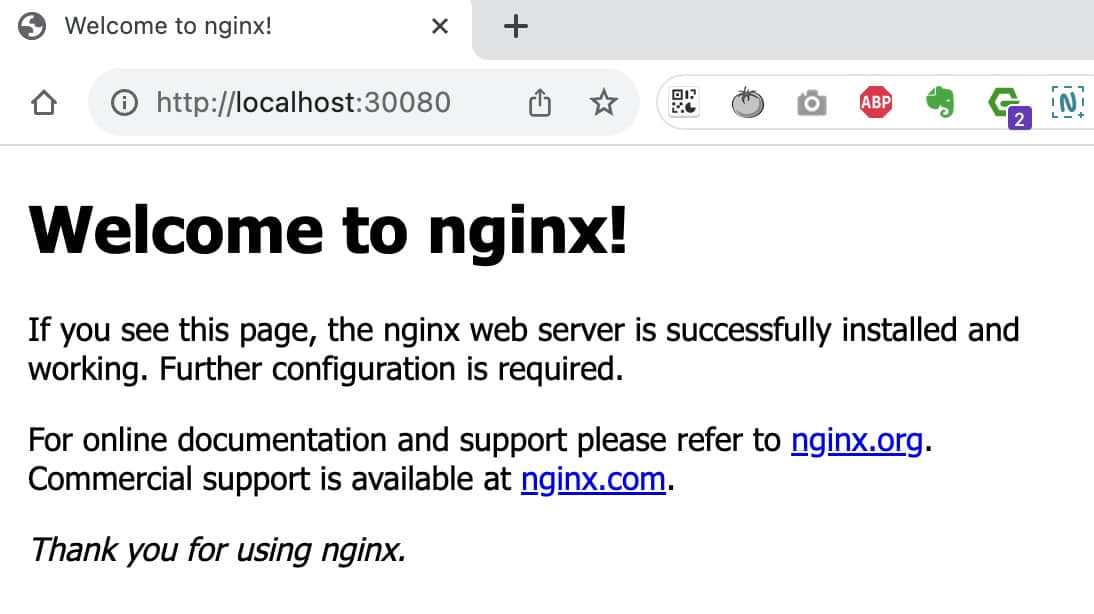
Cleanup KinD
➜ kind delete cluster --name mycluster
Deleting cluster "mycluster" ...
Deleted nodes: ["mycluster-control-plane"]
➜ kind get clusters
No kind clusters found.
➜ kubectl config delete-context kind-mycluster
deleted context kind-mycluster from /Users/damonguo/.kube/config
➜ brew uninstall kindUsing K3S with Multipass
K3S is a lightweight, easy-to-install distribution of Kubernetes.
Multipass is a tool for quickly creating, managing, and operating Ubuntu virtual machines, by Canonical, the company behind Ubuntu.
Basic
OS: macOS
Architecture: ARM64
Virtualization: Multipass
CPUs: 1
Memory: 1Gi
Disk: 10GiB
Installer: HomebrewSetup Multipass
➜ brew install --cask multipass
==> Downloading https://github.com/canonical/multipass/releases/download/v1.12.2/multipass-1.12.2+mac-Darwin.pkg
==> Installing Cask multipass
installer: Package name is multipass
installer: Installing at base path /
installer: The install was successful.
multipass was successfully installed!➜ multipass launch --name k3s-server --cpus 1 --memory 1G --disk 10G
Launched: k3s-server➜ multipass info k3s-server
Name: k3s-server
State: Running
IPv4: 192.168.64.2
Release: Ubuntu 22.04.3 LTS
Image hash: 9256911742f0 (Ubuntu 22.04 LTS)
CPU(s): 1
Load: 0.56 0.15 0.05
Disk usage: 1.4GiB out of 9.6GiB
Memory usage: 140.0MiB out of 962.3MiB
Mounts: --Setup K3S
➜ multipass shell k3s-server
Welcome to Ubuntu 22.04.3 LTS (GNU/Linux 5.15.0-89-generic aarch64)
ubuntu@k3s-server:~$ curl -sfL https://get.k3s.io | sh -
[INFO] Finding release for channel stable
[INFO] Using v1.27.7+k3s2 as release
[INFO] Downloading hash https://github.com/k3s-io/k3s/releases/download/v1.27.7+k3s2/sha256sum-arm64.txt
[INFO] Downloading binary https://github.com/k3s-io/k3s/releases/download/v1.27.7+k3s2/k3s-arm64
[INFO] Verifying binary download
[INFO] Installing k3s to /usr/local/bin/k3s
[INFO] Skipping installation of SELinux RPM
[INFO] Creating /usr/local/bin/kubectl symlink to k3s
[INFO] Creating /usr/local/bin/crictl symlink to k3s
[INFO] Creating /usr/local/bin/ctr symlink to k3s
[INFO] Creating killall script /usr/local/bin/k3s-killall.sh
[INFO] Creating uninstall script /usr/local/bin/k3s-uninstall.sh
[INFO] env: Creating environment file /etc/systemd/system/k3s.service.env
[INFO] systemd: Creating service file /etc/systemd/system/k3s.service
[INFO] systemd: Enabling k3s unit
Created symlink /etc/systemd/system/multi-user.target.wants/k3s.service → /etc/systemd/system/k3s.service.
[INFO] systemd: Starting k3s
ubuntu@k3s-server:~$ sudo k3s kubectl get nodes
NAME STATUS ROLES AGE VERSION
k3s-server Ready control-plane,master 19s v1.27.7+k3s2
ubuntu@k3s-server:~$ sudo ss -lntpu | grep k3s-server
tcp LISTEN 0 4096 127.0.0.1:10248 0.0.0.0:* users:(("k3s-server",pid=2786,fd=172))
tcp LISTEN 0 4096 127.0.0.1:10249 0.0.0.0:* users:(("k3s-server",pid=2786,fd=208))
tcp LISTEN 0 4096 127.0.0.1:6444 0.0.0.0:* users:(("k3s-server",pid=2786,fd=15))
tcp LISTEN 0 4096 127.0.0.1:10256 0.0.0.0:* users:(("k3s-server",pid=2786,fd=206))
tcp LISTEN 0 4096 127.0.0.1:10257 0.0.0.0:* users:(("k3s-server",pid=2786,fd=86))
tcp LISTEN 0 4096 127.0.0.1:10258 0.0.0.0:* users:(("k3s-server",pid=2786,fd=202))
tcp LISTEN 0 4096 127.0.0.1:10259 0.0.0.0:* users:(("k3s-server",pid=2786,fd=209))
tcp LISTEN 0 4096 *:10250 *:* users:(("k3s-server",pid=2786,fd=168))
tcp LISTEN 0 4096 *:6443 *:* users:(("k3s-server",pid=2786,fd=13))
ubuntu@k3s-server:~$ sudo cat /var/lib/rancher/k3s/server/node-token
K10fa8d62310e361852c7607ba12b9667cd05f52122df80ca928448200295bb0969::server:c421b343a4f042a2a3511156664a76b1
ubuntu@k3s-server:~$ exit
logout➜ multipass launch --name k3s-agent --cpus 1 --memory 1G --disk 10G
Launched: k3s-agent➜ multipass list
Name State IPv4 Image
k3s-server Running 192.168.64.2 Ubuntu 22.04 LTS
10.42.0.0
10.42.0.1
k3s-agent Running 192.168.64.3 Ubuntu 22.04 LTS➜ multipass shell k3s-agent
Welcome to Ubuntu 22.04.3 LTS (GNU/Linux 5.15.0-89-generic aarch64)
ubuntu@k3s-agent:~$ curl -sfL https://get.k3s.io | K3S_URL=https://192.168.64.2:6443 K3S_TOKEN="K10fa8d62310e361852c7607ba12b9667cd05f52122df80ca928448200295bb0969::server:c421b343a4f042a2a3511156664a76b1" sh -
[INFO] Finding release for channel stable
[INFO] Using v1.27.7+k3s2 as release
[INFO] Downloading hash https://github.com/k3s-io/k3s/releases/download/v1.27.7+k3s2/sha256sum-arm64.txt
[INFO] Downloading binary https://github.com/k3s-io/k3s/releases/download/v1.27.7+k3s2/k3s-arm64
[INFO] Verifying binary download
[INFO] Installing k3s to /usr/local/bin/k3s
[INFO] Skipping installation of SELinux RPM
[INFO] Creating /usr/local/bin/kubectl symlink to k3s
[INFO] Creating /usr/local/bin/crictl symlink to k3s
[INFO] Creating /usr/local/bin/ctr symlink to k3s
[INFO] Creating killall script /usr/local/bin/k3s-killall.sh
[INFO] Creating uninstall script /usr/local/bin/k3s-agent-uninstall.sh
[INFO] env: Creating environment file /etc/systemd/system/k3s-agent.service.env
[INFO] systemd: Creating service file /etc/systemd/system/k3s-agent.service
[INFO] systemd: Enabling k3s-agent unit
Created symlink /etc/systemd/system/multi-user.target.wants/k3s-agent.service → /etc/systemd/system/k3s-agent.service.
[INFO] systemd: Starting k3s-agent
ubuntu@k3s-agent:~$ exit
logoutDeploy Nginx Service
➜ multipass shell k3s-server
Welcome to Ubuntu 22.04.3 LTS (GNU/Linux 5.15.0-89-generic aarch64)
ubuntu@k3s-server:~$ sudo k3s kubectl get nodes
NAME STATUS ROLES AGE VERSION
k3s-server Ready control-plane,master 9m26s v1.27.7+k3s2
k3s-agent Ready <none> 71s v1.27.7+k3s2ubuntu@k3s-server:~$ vim nginx-deploy-svc.yaml
---
apiVersion: apps/v1
kind: Deployment
metadata:
name: nginx-deploy
spec:
replicas: 2
selector:
matchLabels:
app: nginx
template:
metadata:
labels:
app: nginx
spec:
containers:
- name: nginx
image: nginx
ports:
- containerPort: 80
---
apiVersion: v1
kind: Service
metadata:
name: nginx-svc
spec:
selector:
app: nginx
type: NodePort
ports:
- name: http
port: 80ubuntu@k3s-server:~$ sudo k3s kubectl apply -f nginx-deploy-svc.yaml
deployment.apps/nginx-deploy created
service/nginx-svc createdubuntu@k3s-server:~$ sudo k3s kubectl get all
NAME READY STATUS RESTARTS AGE
pod/nginx-deploy-55f598f8d-pzr6n 1/1 Running 0 20m
pod/nginx-deploy-55f598f8d-z55ng 1/1 Running 0 20m
NAME TYPE CLUSTER-IP EXTERNAL-IP PORT(S) AGE
service/kubernetes ClusterIP 10.43.0.1 <none> 443/TCP 68m
service/nginx-svc NodePort 10.43.202.7 <none> 80:32711/TCP 20m
NAME READY UP-TO-DATE AVAILABLE AGE
deployment.apps/nginx-deploy 2/2 2 2 20m
NAME DESIRED CURRENT READY AGE
replicaset.apps/nginx-deploy-55f598f8d 2 2 2 20m
ubuntu@k3s-server:~$ exit
logout ➜ multipass list
Name State IPv4 Image
k3s-server Running 192.168.64.2 Ubuntu 22.04 LTS
10.42.0.0
10.42.0.1
k3s-agent Running 192.168.64.3 Ubuntu 22.04 LTS
10.42.1.0
10.42.1.1Access Nginx via NodePort: http://192.168.64.2:32711
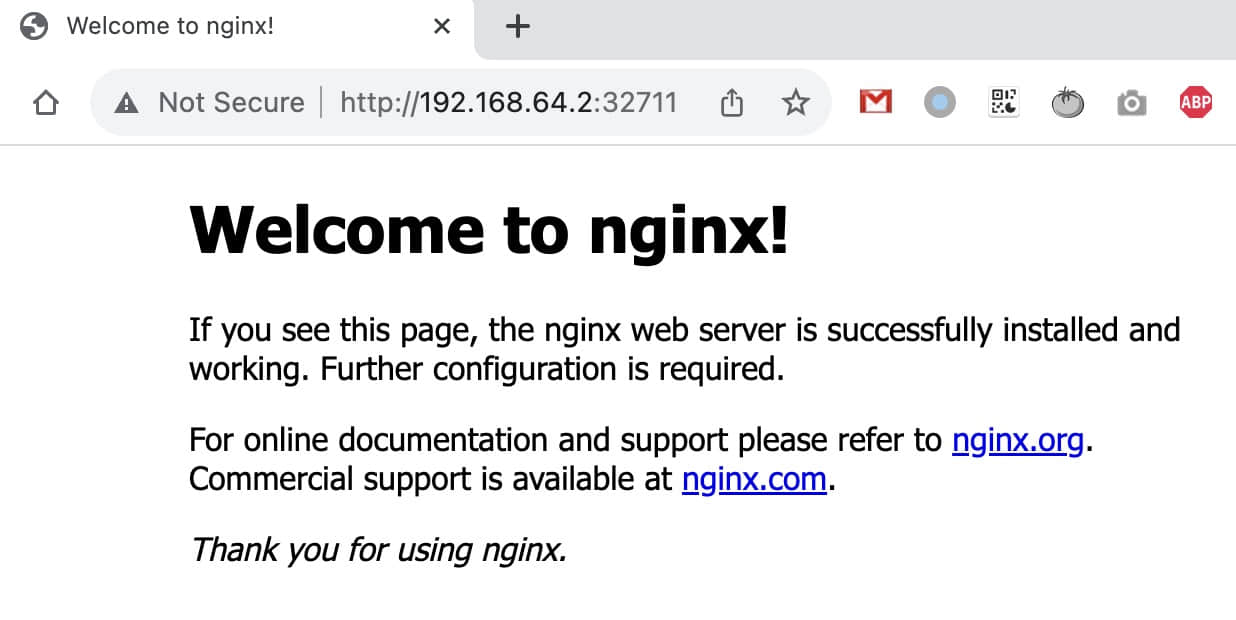
Cleanup Multipass and K3S
➜ multipass delete k3s-server k3s-agent
➜ multipass list
Name State IPv4 Image
k3s-server Deleted -- Not Available
k3s-agent Deleted -- Not Available
➜ multipass purge
➜ multipass list
No instances found.
➜ brew uninstall --cask multipassUsing K3D
K3D is a lightweight wrapper to run K3S in docker.
Basic
OS: macOS
Architecture: ARM64
Driver: Docker
Installer: HomebrewSetup K3D
➜ brew install k3d
==> Installing k3d
==> Pouring k3d--5.6.0.arm64_sonoma.bottle.tar.gz
==> k3d➜ k3d version
k3d version v5.6.0
k3s version v1.27.5-k3s1 (default)Create a cluster ‘mycluster’, mapping the ingress port 80 to localhost:8081.
➜ k3d cluster create mycluster -p "8081:80@loadbalancer" --agents 1
INFO[0000] portmapping '8081:80' targets the loadbalancer: defaulting to [servers:*:proxy agents:*:proxy]
INFO[0000] Prep: Network
INFO[0000] Created network 'k3d-mycluster'
INFO[0000] Created image volume k3d-mycluster-images
INFO[0000] Starting new tools node...
INFO[0000] Starting Node 'k3d-mycluster-tools'
INFO[0001] Creating node 'k3d-mycluster-server-0'
INFO[0001] Creating node 'k3d-mycluster-agent-0'
INFO[0001] Creating LoadBalancer 'k3d-mycluster-serverlb'
INFO[0001] Using the k3d-tools node to gather environment information
INFO[0001] HostIP: using network gateway 192.168.167.1 address
INFO[0001] Starting cluster 'mycluster'
INFO[0001] Starting servers...
INFO[0001] Starting Node 'k3d-mycluster-server-0'
INFO[0004] Starting agents...
INFO[0004] Starting Node 'k3d-mycluster-agent-0'
INFO[0007] Starting helpers...
INFO[0007] Starting Node 'k3d-mycluster-serverlb'
INFO[0013] Injecting records for hostAliases (incl. host.k3d.internal) and for 3 network members into CoreDNS configmap...
INFO[0015] Cluster 'mycluster' created successfully!
INFO[0015] You can now use it like this:
kubectl cluster-info➜ kubectl cluster-info
Kubernetes control plane is running at https://0.0.0.0:56685
CoreDNS is running at https://0.0.0.0:56685/api/v1/namespaces/kube-system/services/kube-dns:dns/proxy
Metrics-server is running at https://0.0.0.0:56685/api/v1/namespaces/kube-system/services/https:metrics-server:https/proxyDeploy Nginx Service
➜ kubectl get all
NAME TYPE CLUSTER-IP EXTERNAL-IP PORT(S) AGE
service/kubernetes ClusterIP 10.43.0.1 <none> 443/TCP 48s➜ vim nginx-deploy-svc-ingress.yaml
---
apiVersion: apps/v1
kind: Deployment
metadata:
name: nginx-deploy
spec:
replicas: 2
selector:
matchLabels:
app: nginx
template:
metadata:
labels:
app: nginx
spec:
containers:
- name: nginx
image: nginx
ports:
- containerPort: 80
---
apiVersion: v1
kind: Service
metadata:
name: nginx-svc
spec:
selector:
app: nginx
type: NodePort
ports:
- name: http
port: 80
---
apiVersion: networking.k8s.io/v1
kind: Ingress
metadata:
name: nginx-ingress
annotations:
ingress.kubernetes.io/ssl-redirect: "false"
spec:
rules:
- http:
paths:
- path: /
pathType: Prefix
backend:
service:
name: nginx-svc
port:
number: 80➜ kubectl apply -f nginx-deploy-svc-ingress.yaml
deployment.apps/nginx-deploy created
service/nginx-svc created
ingress.networking.k8s.io/nginx-ingress created➜ kubectl get all
NAME READY STATUS RESTARTS AGE
pod/nginx-deploy-55f598f8d-z9n5v 1/1 Running 0 2m
pod/nginx-deploy-55f598f8d-h5zkb 1/1 Running 0 2m
NAME TYPE CLUSTER-IP EXTERNAL-IP PORT(S) AGE
service/kubernetes ClusterIP 10.43.0.1 <none> 443/TCP 3m12s
service/nginx-svc NodePort 10.43.58.173 <none> 80:32459/TCP 2m
NAME READY UP-TO-DATE AVAILABLE AGE
deployment.apps/nginx-deploy 2/2 2 2 2m
NAME DESIRED CURRENT READY AGE
replicaset.apps/nginx-deploy-55f598f8d 2 2 2 2m➜ kubectl get ingress
NAME CLASS HOSTS ADDRESS PORTS AGE
nginx-ingress <none> * 192.168.167.2,192.168.167.3 80 2m56sAccess Nginx via Ingress: http://localhost:8081
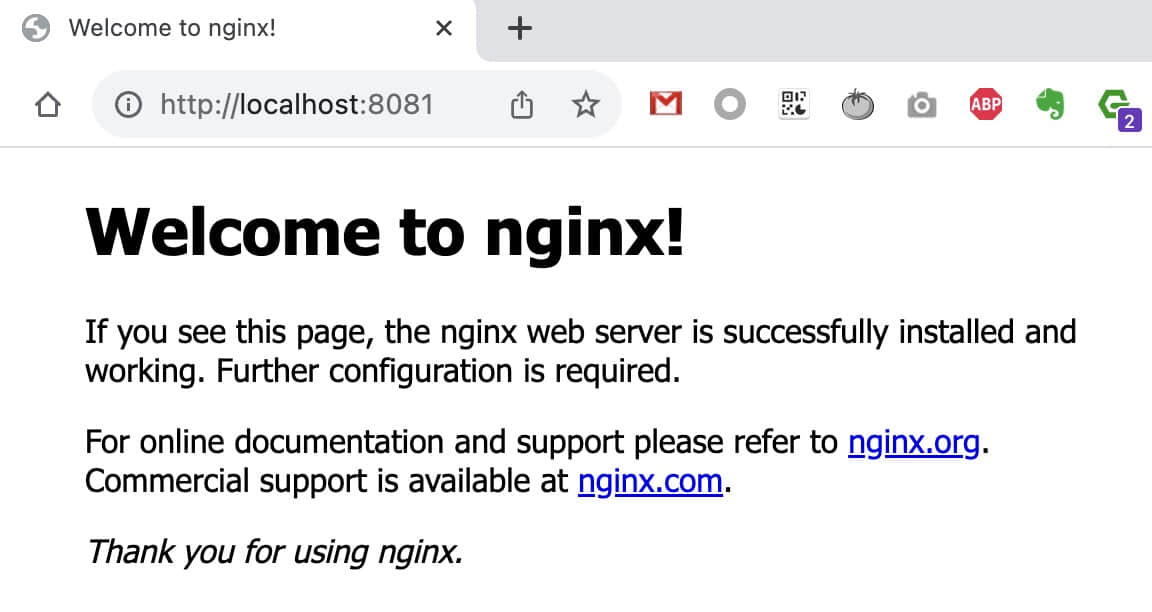
Cleanup K3D
➜ k3d cluster list
NAME SERVERS AGENTS LOADBALANCER
mycluster 1/1 1/1 true
➜ k3d cluster delete mycluster
INFO[0000] Deleting cluster 'mycluster'
INFO[0000] Deleting cluster network 'k3d-mycluster'
INFO[0000] Deleting 1 attached volumes...
INFO[0000] Removing cluster details from default kubeconfig...
INFO[0000] Removing standalone kubeconfig file (if there is one)...
INFO[0000] Successfully deleted cluster mycluster!
➜ k3d cluster list
NAME SERVERS AGENTS LOADBALANCER
➜ brew uninstall k3dUsing MicroK8s with Multipass
MicroK8s is a low-ops, minimal production Kubernetes by Canonical, the company behind Ubuntu.
Multipass is a tool for quickly creating, managing, and operating Ubuntu virtual machines, by Canonical, the company behind Ubuntu.
Basic
OS: macOS
Architecture: ARM64
Virtualization: Multipass
Installer: HomebrewSetup Multipass
➜ brew install --cask multipass
==> Downloading https://github.com/canonical/multipass/releases/download/v1.12.2/multipass-1.12.2+mac-Darwin.pkg
==> Installing Cask multipass
installer: Package name is multipass
installer: Installing at base path /
installer: The install was successful.
multipass was successfully installed!
➜ multipass list
No instances found.Setup MicroK8s
➜ brew install ubuntu/microk8s/microk8s
==> Tapping ubuntu/microk8s
Cloning into '/opt/homebrew/Library/Taps/ubuntu/homebrew-microk8s'...
==> Fetching ubuntu/microk8s/microk8s
==> Installing microk8s from ubuntu/microk8s
Run `microk8s install` to start with MicroK8s➜ microk8s install
Launched: microk8s-vm
microk8s (1.28/stable) v1.28.15 from Canonical✓ installed
microk8s-integrator-macos 0.1 from Canonical✓ installed
MicroK8s is up and running. See the available commands with `microk8s --help`.➜ microk8s status --wait-ready
microk8s is running
high-availability: no
datastore master nodes: 127.0.0.1:19001
datastore standby nodes: none
addons:
enabled:
dns # (core) CoreDNS
ha-cluster # (core) Configure high availability on the current node
helm # (core) Helm - the package manager for Kubernetes
helm3 # (core) Helm 3 - the package manager for Kubernetes
disabled:
cert-manager # (core) Cloud native certificate management
cis-hardening # (core) Apply CIS K8s hardening
community # (core) The community addons repository
dashboard # (core) The Kubernetes dashboard
host-access # (core) Allow Pods connecting to Host services smoothly
hostpath-storage # (core) Storage class; allocates storage from host directory
ingress # (core) Ingress controller for external access
kube-ovn # (core) An advanced network fabric for Kubernetes
mayastor # (core) OpenEBS MayaStor
metallb # (core) Loadbalancer for your Kubernetes cluster
metrics-server # (core) K8s Metrics Server for API access to service metrics
minio # (core) MinIO object storage
observability # (core) A lightweight observability stack for logs, traces and metrics
prometheus # (core) Prometheus operator for monitoring and logging
rbac # (core) Role-Based Access Control for authorisation
registry # (core) Private image registry exposed on localhost:32000
rook-ceph # (core) Distributed Ceph storage using Rook
storage # (core) Alias to hostpath-storage add-on, deprecated➜ multipass info microk8s-vm
Name: microk8s-vm
State: Running
Snapshots: 0
IPv4: 192.168.64.6
10.1.254.64
Release: Ubuntu 22.04.5 LTS
Image hash: 7b86a56f8069 (Ubuntu 22.04 LTS)
CPU(s): 2
Load: 0.73 0.40 0.16
Disk usage: 2.9GiB out of 48.4GiB
Memory usage: 624.6MiB out of 3.8GiB
Mounts: --Enable addon ingress
➜ microk8s enable ingress
Infer repository core for addon ingress
Enabling Ingress
ingressclass.networking.k8s.io/public created
ingressclass.networking.k8s.io/nginx created
namespace/ingress created
serviceaccount/nginx-ingress-microk8s-serviceaccount created
clusterrole.rbac.authorization.k8s.io/nginx-ingress-microk8s-clusterrole created
role.rbac.authorization.k8s.io/nginx-ingress-microk8s-role created
clusterrolebinding.rbac.authorization.k8s.io/nginx-ingress-microk8s created
rolebinding.rbac.authorization.k8s.io/nginx-ingress-microk8s created
configmap/nginx-load-balancer-microk8s-conf created
configmap/nginx-ingress-tcp-microk8s-conf created
configmap/nginx-ingress-udp-microk8s-conf created
daemonset.apps/nginx-ingress-microk8s-controller created
Ingress is enabledDeploy Nginx Service
➜ vim nginx-deploy-svc-ingress.yaml
---
apiVersion: apps/v1
kind: Deployment
metadata:
name: nginx-deploy
spec:
replicas: 2
selector:
matchLabels:
app: nginx
template:
metadata:
labels:
app: nginx
spec:
containers:
- name: nginx
image: nginx
ports:
- containerPort: 80
---
apiVersion: v1
kind: Service
metadata:
name: nginx-svc
spec:
selector:
app: nginx
type: NodePort
ports:
- name: http
port: 80
---
apiVersion: networking.k8s.io/v1
kind: Ingress
metadata:
name: nginx-ingress
annotations:
nginx.ingress.kubernetes.io/rewrite-target: /
spec:
rules:
- http:
paths:
- path: /
pathType: Prefix
backend:
service:
name: nginx-svc
port:
number: 80➜ microk8s kubectl apply -f nginx-deploy-svc-ingress.yaml
deployment.apps/nginx-deploy created
service/nginx-svc created
ingress.networking.k8s.io/nginx-ingress created➜ microk8s kubectl get all
NAME READY STATUS RESTARTS AGE
pod/nginx-deploy-7c5ddbdf54-ld8xc 1/1 Running 0 62s
pod/nginx-deploy-7c5ddbdf54-t44vz 1/1 Running 0 62s
NAME TYPE CLUSTER-IP EXTERNAL-IP PORT(S) AGE
service/kubernetes ClusterIP 10.152.183.1 <none> 443/TCP 22m
service/nginx-svc NodePort 10.152.183.115 <none> 80:30945/TCP 62s
NAME READY UP-TO-DATE AVAILABLE AGE
deployment.apps/nginx-deploy 2/2 2 2 62s
NAME DESIRED CURRENT READY AGE
replicaset.apps/nginx-deploy-7c5ddbdf54 2 2 2 62s➜ microk8s kubectl get ingress
NAME CLASS HOSTS ADDRESS PORTS AGE
nginx-ingress public * 127.0.0.1 80 2m17sAccess Nginx via Ingress: http://192.168.64.6:80
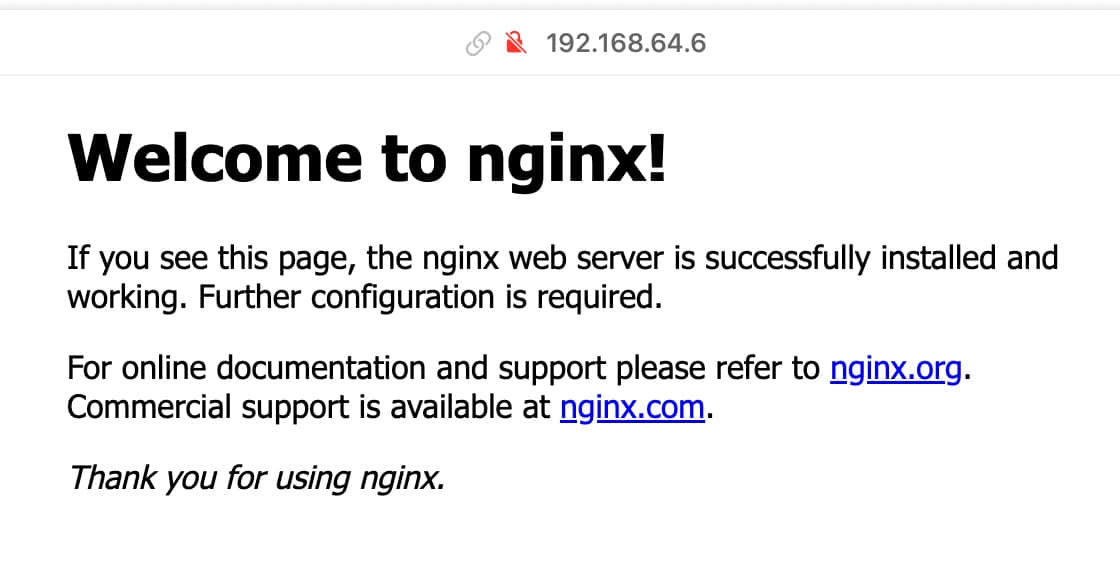
Cleanup Multipass and MicroK8s
➜ microk8s stop
Stopped.
➜ brew uninstall ubuntu/microk8s/microk8s
➜ brew untap ubuntu/microk8s
➜ rm -rf ~/.microk8s
➜ multipass delete microk8s-vm
➜ multipass purge
➜ multipass list
No instances found.
➜ brew uninstall --cask multipassUsing K0S with Multipass
K0S is a simple, solid & certified Kubernetes distribution.
Multipass is a tool for quickly creating, managing, and operating Ubuntu virtual machines, by Canonical, the company behind Ubuntu.
Basic
OS: macOS
Architecture: ARM64
Virtualization: Multipass
CPUs: 1
Memory: 1Gi
Disk: 10GiB
Installer: HomebrewSetup Multipass
➜ brew install --cask multipass
==> Downloading https://github.com/canonical/multipass/releases/download/v1.16.0/multipass-1.16.0+mac-Darwin.pkg
==> Installing Cask multipass
installer: Package name is multipass
installer: Installing at base path /
installer: The install was successful.
multipass was successfully installed!➜ multipass launch --name k0s-controller --cpus 1 --mem 1G --disk 10G
Launched: k0s-controller
➜ multipass launch --name k0s-worker --cpus 1 --mem 1G --disk 10G
Launched: k0s-worker➜ multipass info k0s-controller
Name: k0s-controller
State: Running
Snapshots: 0
IPv4: 192.168.64.7
Release: Ubuntu 24.04.2 LTS
Image hash: bbecbb88100e (Ubuntu 24.04 LTS)
CPU(s): 1
Load: 0.04 0.03 0.01
Disk usage: 2.0GiB out of 9.6GiB
Memory usage: 222.6MiB out of 952.9MiB
Mounts: --
➜ multipass info k0s-worker
Name: k0s-worker
State: Running
Snapshots: 0
IPv4: 192.168.64.8
Release: Ubuntu 24.04.2 LTS
Image hash: bbecbb88100e (Ubuntu 24.04 LTS)
CPU(s): 1
Load: 0.04 0.01 0.00
Disk usage: 2.0GiB out of 9.6GiB
Memory usage: 222.4MiB out of 952.9MiB
Mounts: --➜ multipass exec k0s-controller -- bash -c "mkdir -p ~/.ssh && echo '$(cat ~/.ssh/id_rsa.pub)' >> ~/.ssh/authorized_keys"
➜ multipass exec k0s-worker -- bash -c "mkdir -p ~/.ssh && echo '$(cat ~/.ssh/id_rsa.pub)' >> ~/.ssh/authorized_keys"
➜ ssh ubuntu@192.168.64.7
Are you sure you want to continue connecting (yes/no/[fingerprint])? yes
ubuntu@k0s-worker:~$ exit
logout
Connection to 192.168.64.7 closed.
➜ ssh ubuntu@192.168.64.8
Are you sure you want to continue connecting (yes/no/[fingerprint])? yes
ubuntu@k0s-worker:~$ exit
logout
Connection to 192.168.64.8 closed.Setup K0S
➜ brew install k0sproject/tap/k0sctl
==> Tapping k0sproject/tap
Cloning into '/opt/homebrew/Library/Taps/k0sproject/homebrew-tap'...
Tapped 2 formulae (17 files, 98KB).
==> Fetching k0sproject/tap/k0sctl
==> Downloading https://github.com/k0sproject/homebrew-tap/releases/download/k0sctl-0.25.1/k0sctl-0.25.1.arm64_sonoma.bottle.tar.gz
==> Installing k0sctl from k0sproject/tap
==> Pouring k0sctl-0.25.1.arm64_sonoma.bottle.tar.gz
/opt/homebrew/Cellar/k0sctl/0.25.1: 9 files, 18.6MB➜ k0sctl init > k0sctl.yaml➜ vim k0sctl.yaml
apiVersion: k0sctl.k0sproject.io/v1beta1
kind: Cluster
metadata:
name: k0s-cluster
user: admin
spec:
hosts:
- ssh:
address: 192.168.64.7
user: ubuntu
port: 22
keyPath: ~/.ssh/id_rsa
role: controller
- ssh:
address: 192.168.64.8
user: ubuntu
port: 22
keyPath: ~/.ssh/id_rsa
role: worker
options:
wait:
enabled: true
drain:
enabled: true
gracePeriod: 2m0s
timeout: 5m0s
force: true
ignoreDaemonSets: true
deleteEmptyDirData: true
podSelector: ""
skipWaitForDeleteTimeout: 0s
concurrency:
limit: 30
workerDisruptionPercent: 10
uploads: 5
evictTaint:
enabled: false
taint: k0sctl.k0sproject.io/evict=true
effect: NoExecute
controllerWorkers: false➜ k0sctl apply --config k0sctl.yaml
INFO ==> Running phase: Set k0s version
INFO Looking up latest stable k0s version
INFO Using k0s version v1.33.2+k0s.0
INFO ==> Running phase: Connect to hosts
INFO [ssh] 192.168.64.8:22: connected
INFO [ssh] 192.168.64.7:22: connected
INFO ==> Running phase: Detect host operating systems
INFO [ssh] 192.168.64.7:22: is running Ubuntu 24.04.2 LTS
INFO [ssh] 192.168.64.8:22: is running Ubuntu 24.04.2 LTS
INFO ==> Running phase: Acquire exclusive host lock
INFO ==> Running phase: Prepare hosts
INFO ==> Running phase: Gather host facts
INFO [ssh] 192.168.64.7:22: using k0s-controller as hostname
INFO [ssh] 192.168.64.8:22: using k0s-worker as hostname
INFO [ssh] 192.168.64.7:22: discovered enp0s1 as private interface
INFO [ssh] 192.168.64.8:22: discovered enp0s1 as private interface
INFO ==> Running phase: Validate hosts
INFO validating clock skew
INFO ==> Running phase: Validate facts
INFO ==> Running phase: Download k0s on hosts
INFO [ssh] 192.168.64.8:22: downloading k0s v1.33.2+k0s.0
INFO [ssh] 192.168.64.7:22: downloading k0s v1.33.2+k0s.0
INFO ==> Running phase: Install k0s binaries on hosts
INFO [ssh] 192.168.64.7:22: validating configuration
INFO ==> Running phase: Configure k0s
INFO [ssh] 192.168.64.7:22: installing new configuration
INFO ==> Running phase: Initialize the k0s cluster
INFO [ssh] 192.168.64.7:22: installing k0s controller
INFO [ssh] 192.168.64.7:22: waiting for the k0s service to start
INFO [ssh] 192.168.64.7:22: wait for kubernetes to reach ready state
INFO ==> Running phase: Install workers
INFO [ssh] 192.168.64.7:22: generating a join token for worker 1
INFO [ssh] 192.168.64.8:22: validating api connection to https://192.168.64.7:6443 using join token
INFO [ssh] 192.168.64.8:22: writing join token to /etc/k0s/k0stoken
INFO [ssh] 192.168.64.8:22: installing k0s worker
INFO [ssh] 192.168.64.8:22: starting service
INFO [ssh] 192.168.64.8:22: waiting for node to become ready
INFO ==> Running phase: Release exclusive host lock
INFO ==> Running phase: Disconnect from hosts
INFO ==> Finished in 1m18s
INFO k0s cluster version v1.33.2+k0s.0 is now installed
INFO Tip: To access the cluster you can now fetch the admin kubeconfig using:
INFO k0sctl kubeconfig➜ k0sctl kubeconfig > k0s.kubeconfig
➜ kubectl --kubeconfig=k0s.kubeconfig get all --all-namespaces
NAMESPACE NAME READY STATUS RESTARTS AGE
kube-system pod/coredns-5c8cb48c4-rr9k2 1/1 Running 0 8m54s
kube-system pod/konnectivity-agent-sndm9 1/1 Running 0 8m50s
kube-system pod/kube-proxy-csvw7 1/1 Running 0 8m53s
kube-system pod/kube-router-5nn4t 1/1 Running 0 8m53s
kube-system pod/metrics-server-7db8586f5-d7p8h 1/1 Running 0 8m50s
NAMESPACE NAME TYPE CLUSTER-IP EXTERNAL-IP PORT(S) AGE
default service/kubernetes ClusterIP 10.96.0.1 <none> 443/TCP 9m5s
kube-system service/kube-dns ClusterIP 10.96.0.10 <none> 53/UDP,53/TCP,9153/TCP 8m55s
kube-system service/metrics-server ClusterIP 10.98.32.18 <none> 443/TCP 8m50s
NAMESPACE NAME DESIRED CURRENT READY UP-TO-DATE AVAILABLE NODE SELECTOR AGE
kube-system daemonset.apps/konnectivity-agent 1 1 1 1 1 kubernetes.io/os=linux 8m59s
kube-system daemonset.apps/kube-proxy 1 1 1 1 1 kubernetes.io/os=linux 8m55s
kube-system daemonset.apps/kube-router 1 1 1 1 1 <none> 8m56s
NAMESPACE NAME READY UP-TO-DATE AVAILABLE AGE
kube-system deployment.apps/coredns 1/1 1 1 8m56s
kube-system deployment.apps/metrics-server 1/1 1 1 8m50s
NAMESPACE NAME DESIRED CURRENT READY AGE
kube-system replicaset.apps/coredns-5c8cb48c4 1 1 1 8m55s
kube-system replicaset.apps/metrics-server-7db8586f5 1 1 1 8m50sDeploy Nginx Service
➜ vim nginx-deploy-svc.yaml
---
apiVersion: apps/v1
kind: Deployment
metadata:
name: nginx-deploy
spec:
replicas: 2
selector:
matchLabels:
app: nginx
template:
metadata:
labels:
app: nginx
spec:
containers:
- name: nginx
image: nginx
ports:
- containerPort: 80
---
apiVersion: v1
kind: Service
metadata:
name: nginx-svc
spec:
selector:
app: nginx
type: NodePort
ports:
- name: http
port: 80➜ kubectl --kubeconfig=k0s.kubeconfig apply -f nginx-deploy-svc.yaml
deployment.apps/nginx-deploy created
service/nginx-svc created
➜ kubectl --kubeconfig=k0s.kubeconfig get all
NAME READY STATUS RESTARTS AGE
pod/nginx-deploy-86c57bc6b8-pm68d 1/1 Running 0 22s
pod/nginx-deploy-86c57bc6b8-tchhj 1/1 Running 0 22s
NAME TYPE CLUSTER-IP EXTERNAL-IP PORT(S) AGE
service/kubernetes ClusterIP 10.96.0.1 <none> 443/TCP 33m
service/nginx-svc NodePort 10.104.182.55 <none> 80:32110/TCP 22s
NAME READY UP-TO-DATE AVAILABLE AGE
deployment.apps/nginx-deploy 2/2 2 2 22s
NAME DESIRED CURRENT READY AGE
replicaset.apps/nginx-deploy-86c57bc6b8 2 2 2 22sAccess Nginx via NodePort: http://192.168.64.8:32110
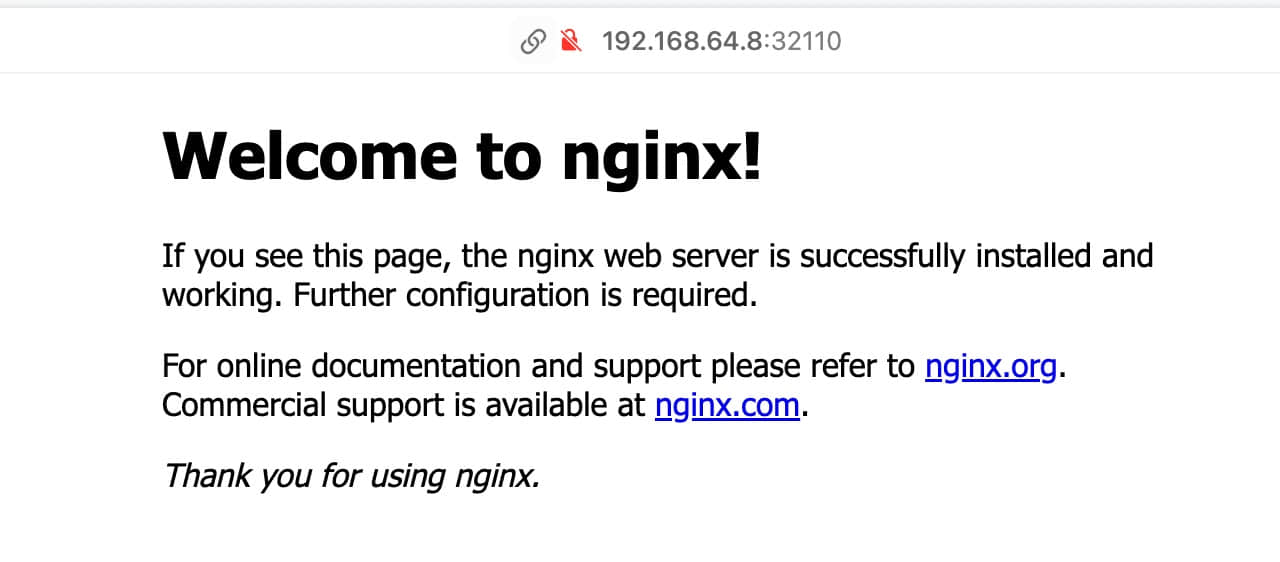
Cleanup Multipass and K0S
➜ multipass shell k0s-controller
ubuntu@k0s-controller:~$ sudo k0s status
Version: v1.33.2+k0s.0
Process ID: 2213
Role: controller
Workloads: false
SingleNode: false
ubuntu@k0s-controller:~$ sudo k0s kubectl get nodes
NAME STATUS ROLES AGE VERSION
k0s-worker Ready <none> 40m v1.33.2+k0s
ubuntu@k0s-controller:~$ sudo k0s stop
ubuntu@k0s-controller:~$ exit
logout➜ multipass delete k0s-controller k0s-worker
➜ multipass list
Name State IPv4 Image
k0s-controller Deleted -- Ubuntu 24.04 LTS
k0s-worker Deleted -- Ubuntu 24.04 LTS
➜ multipass purge
➜ multipass list
No instances found.➜ brew uninstall --cask multipass
➜ brew uninstall k0sctl
➜ brew untap k0sproject/tapUsing Talos
Talos is a secure, immutable, and minimal container optimized Linux distro designed for Kubernetes.
Basic
OS: macOS
Architecture: ARM64
Driver: Docker
Installer: HomebrewSetup Talos
➜ brew install siderolabs/tap/talosctl
==> Tapping siderolabs/tap
Cloning into '/opt/homebrew/Library/Taps/siderolabs/homebrew-tap'...
==> Fetching siderolabs/tap/talosctl
==> Downloading https://github.com/siderolabs/talos/releases/download/v1.10.5/talosctl-darwin-arm64
==> Installing talosctl from siderolabs/tap
/opt/homebrew/Cellar/talosctl/1.10.5: 7 files, 85.6MB, built in 4 seconds➜ talosctl cluster create
validating CIDR and reserving IPs
generating PKI and tokens
creating state directory in "/Users/damonguo/.talos/clusters/talos-default"
downloading ghcr.io/siderolabs/talos:v1.10.5
creating network talos-default
creating controlplane nodes
creating worker nodes
waiting for API
bootstrapping cluster
waiting for etcd to be healthy: OK
waiting for etcd members to be consistent across nodes: OK
waiting for etcd members to be control plane nodes: OK
waiting for apid to be ready: OK
waiting for all nodes memory sizes: OK
waiting for all nodes disk sizes: OK
waiting for no diagnostics: OK
waiting for kubelet to be healthy: OK
waiting for all nodes to finish boot sequence: OK
waiting for all k8s nodes to report: OK
waiting for all control plane static pods to be running: OK
waiting for all control plane components to be ready: OK
waiting for all k8s nodes to report ready: OK
waiting for kube-proxy to report ready: OK
waiting for coredns to report ready: OK
waiting for all k8s nodes to report schedulable: OK
merging kubeconfig into "/Users/damonguo/.kube/config"
PROVISIONER docker
NAME talos-default
NETWORK NAME talos-default
NETWORK CIDR 10.5.0.0/24
NETWORK GATEWAY 10.5.0.1
NETWORK MTU 1500
KUBERNETES ENDPOINT https://127.0.0.1:60132
NODES:
NAME TYPE IP CPU RAM DISK
/talos-default-controlplane-1 controlplane 10.5.0.2 2.00 2.1 GB -
/talos-default-worker-1 worker 10.5.0.3 2.00 2.1 GB -➜ kubectl get nodes -o wide
NAME STATUS ROLES AGE VERSION INTERNAL-IP EXTERNAL-IP OS-IMAGE KERNEL-VERSION CONTAINER-RUNTIME
talos-default-controlplane-1 Ready control-plane 108s v1.33.2 10.5.0.2 <none> Talos (v1.10.5) 6.14.10-orbstack-00291-g1b252bd3edea containerd://2.0.5
talos-default-worker-1 Ready <none> 102s v1.33.2 10.5.0.3 <none> Talos (v1.10.5) 6.14.10-orbstack-00291-g1b252bd3edea containerd://2.0.5Deploy Nginx Service
➜ vim nginx-deploy-svc.yaml
---
apiVersion: apps/v1
kind: Deployment
metadata:
name: nginx-deploy
spec:
replicas: 2
selector:
matchLabels:
app: nginx
template:
metadata:
labels:
app: nginx
spec:
containers:
- name: nginx
image: nginx
ports:
- containerPort: 80
---
apiVersion: v1
kind: Service
metadata:
name: nginx-svc
spec:
selector:
app: nginx
type: NodePort
ports:
- name: http
port: 80➜ kubectl apply -f nginx-deploy-svc.yaml
Warning: would violate PodSecurity "restricted:latest": allowPrivilegeEscalation != false (container "nginx" must set securityContext.allowPrivilegeEscalation=false), unrestricted capabilities (container "nginx" must set securityContext.capabilities.drop=["ALL"]), runAsNonRoot != true (pod or container "nginx" must set securityContext.runAsNonRoot=true), seccompProfile (pod or container "nginx" must set securityContext.seccompProfile.type to "RuntimeDefault" or "Localhost")
deployment.apps/nginx-deploy created
service/nginx-svc created➜ kubectl get all
NAME READY STATUS RESTARTS AGE
pod/nginx-deploy-86c57bc6b8-dk5fh 1/1 Running 0 33s
pod/nginx-deploy-86c57bc6b8-hb44f 1/1 Running 0 33s
NAME TYPE CLUSTER-IP EXTERNAL-IP PORT(S) AGE
service/kubernetes ClusterIP 10.96.0.1 <none> 443/TCP 8m7s
service/nginx-svc NodePort 10.109.129.119 <none> 80:32659/TCP 33s
NAME READY UP-TO-DATE AVAILABLE AGE
deployment.apps/nginx-deploy 2/2 2 2 33s
NAME DESIRED CURRENT READY AGE
replicaset.apps/nginx-deploy-86c57bc6b8 2 2 2 33s➜ kubectl port-forward svc/nginx-svc 30081:80
Forwarding from 127.0.0.1:30081 -> 80
Forwarding from [::1]:30081 -> 80Access Nginx via NodePort Local PortMapping: http://127.0.0.1:30081
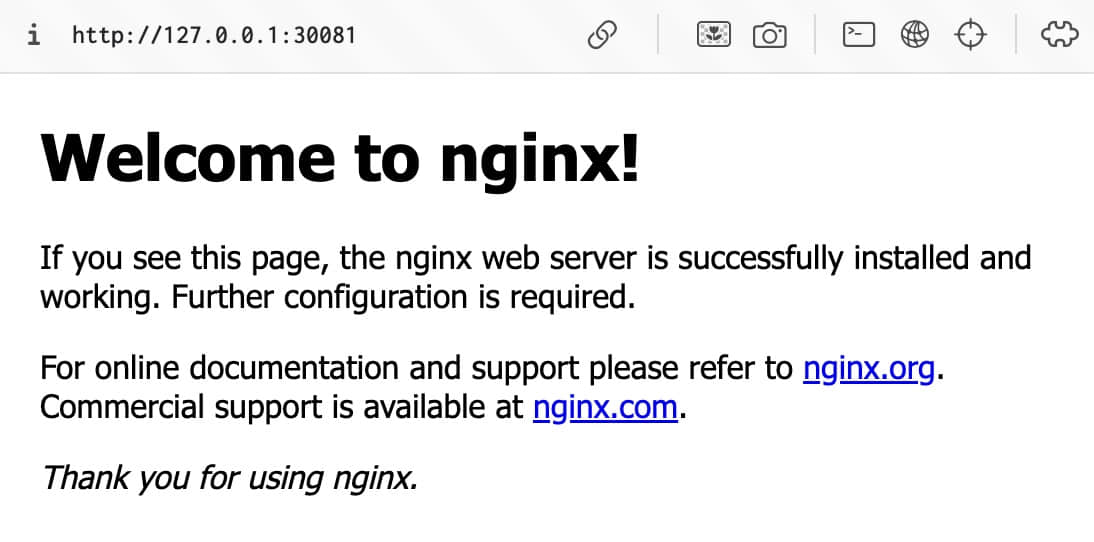
Cleanup Talos
➜ talosctl cluster destroy
destroying node talos-default-controlplane-1
destroying node talos-default-worker-1
destroying network talos-default
➜ talosctl cluster show
PROVISIONER docker
NAME talos-default
NETWORK NAME
NETWORK CIDR
NETWORK GATEWAY
NETWORK MTU 0
KUBERNETES ENDPOINT
NODES:
NAME TYPE IP CPU RAM DISK
➜ kubectl config delete-context admin@talos-default
deleted context admin@talos-default from /Users/damonguo/.kube/config➜ brew uninstall talosctl
➜ brew untap siderolabs/tapSummary
Lightweight Kubernetes differ in cluster mode, storage, runtime, requirements, setup, and plugins. Choose based on your use case and technical preferences.
| Distribution | Cluster Mode | Storage | Runtime | Requirements | Setup | Plugins | Use Case |
|---|---|---|---|---|---|---|---|
| Minikube | Single-node | etcd | Podman / Docker / containerd | Podman / Docker | Easy | Good | Dev |
| KinD | Single-node | etcd | containerd | Docker | Easy | Poor | Dev, CI/CD |
| K3S | Multi-node | SQLite / etcd / MySQL / PostgreSQL | containerd | Linux | Moderate | Fair | Edge, Prod |
| K3D | Single-node | SQLite / etcd / MySQL / PostgreSQL | containerd | Docker | Easy | Fair | Dev, CI/CD |
| MicroK8s | Multi-node | etcd / dqlite (distributed SQLite) | containerd / Kata | Linux | Moderate | Good | Dev, Prod |
| K0S | Multi-node | etcd / SQLite / MySQL / PostgreSQL | containerd | Linux | Moderate | Average | Edge, Prod |
| Talos | Multi-node | etcd | containerd | Docker | Easy | Poor | Dev, Prod |